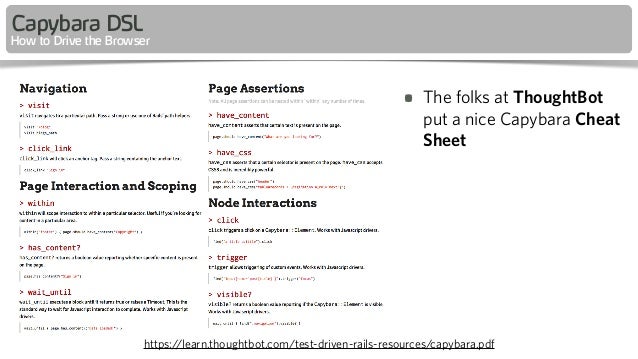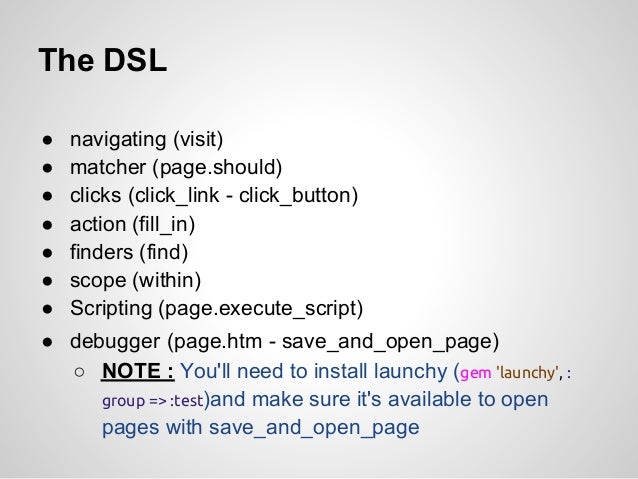Rspec Cheat Sheet
In my previous posts I did some writngs on UTPLSQL and ruby-plsql.
Rspec-Rails Cheat Sheet. Table of contents. Time helpers; Matchers. Sass is a preprocessor scripting language that is interpreted or compiled into Cascading Style. If you run the above in a directory of pictures, it will resize all pictures in the current directory. For my needs, I passed -Z to keep the ratio, and a maximum height of 1024 pixels. As always, make sure to keep the original in case you don’t like the results! Briefly look over RSpec’s other matchers, if you haven’t done so already. Briefly look over the RSpec styling and syntax recommended by BetterSpecs and read through the first six guidelines. The RSpec Cheat Sheet should help you avoid Googling every new bit of syntax.
For long time, while developing Oracle code I was using ruby-plsql to do test driven development for SQL and PL/SQL.
I used to frequently forget how to use some of the functionalities of ruby-plsql, specially after having a longer break and so each time I was referring the Unit Tests supplied for the ruby-plsql library as a reference. They are really nicely documenting how things work and how can they be used. It usually took me few minutes to find the thing I needed.
While I was actively using ruby-plsql for testing Oracle SQL and PLSQL code, it never occurred to me, that it would be nice to have some kind of cheat sheet, and so I wasted the valuable seconds and minutes to figure out how to do things I needed to do.
This week however, Turntablez posted a suggestion on ruby-plsql-spec github project page that a cheat sheet would be something of a use.
It was a really great idea, saves precious minutes when you need to use something you’re not used to or just don’t do every day.
So here it is, fully downloadable, editable and hopefully usable Cheat Sheet for ruby-plsql.
It’s not a reference, it’s not complete (or official), but hopefully it’s a good overview and a fast help if you need to see how things work.
Update
If you prefer a more visual/printable form, you might want to check out the same Cheat Sheet on http://www.cheatography.com/jgebal/cheat-sheets/ruby-plsql-cheat-sheet/
Or just download the PDF version.
File manager for iphone mac.
If you like it, share it, rate it, comment it.
Hooks
Use instance variables to make objects available to examples
customer is a local variable and will not be available@customer is an instance variable and will be available
describe 'Car' do describe 'attributes' do
endend
Let method
let(:car) {..} #lazy executed, waitslet!(:car) {..} #eager executed, runs right awayLet method should be used for variables
let(:car) { Car.new }it 'allows reading for :wheels' do expect(car.wheels).to eq(4) #car.wheels is a METHOD callend
Setting a subject
Shorthand thats available, don't have to use it.Can use 'subject' instead of 'let' if variable is subject of example
let(:subject) { Car.new } #var is subject of examplesubject { Car.new } #shorthand, same as above, because so common. subject!{..} also eager executed
it 'allows reading for :wheels' do expect(subject.wheels).to eq(4) #car.wheels is a METHOD callend
Implicitly defined subjects
Describe can accept either a string or a class name
describe Car it '..'
#instead of
describe 'car' subject { Car.new }

Shared Examples
It's a shared file that can be used across different classes

Test Doubles. What are test doubles?

Test doubles are an object that stands in for another objectAliases: Doubles, mocks, stubs, fakes, spies, dummies
Double/Mock
A simple object preprogrammed with expectations and responses as preparation for the calls it will receive
Stub - a fake method
An instruction to an object to return a specific response to a method call
Double Example
it 'allows stubbing methods' do dbl = double('Chant') #create object allow(dbl).to receive(:hey!) #give object thing to do, or a 'fake method' here expect(dbl).to respond_to(:hey!)end
it 'allows stubbing methods' do dbl = double('Chant') #create object allow(dbl).to receive(:hey!).and_return('Ho!')#give object thing to do, or a 'fake method' here, and return {'Ho!'} allow(dbl).to receive(:hey!) {'Ho!'} #same as above, but can use logic in the return block here expect(dbl.hey!).to eq('Ho!')end
it 'allows setting multiple responses' do die = double('Die') allow(die).to receive(:roll).and_return(1,5,2,6) expect(die.roll).to eq(1) expect(die.roll).to eq(5) expect(die.roll).to eq(2) expect(die.roll).to eq(6)end
Partial Test Doubles
Adding a method .to receive(:some_non_existant_method).and_return('Something it wouldn't normally return')
Message Expectations
Rspec Matchers Cheat Sheet
Ruby sends 'messages' to objects to call methods. RSpec can set expectations about those messages

#instead of allow(dbl).to receive(:hey!).and_return('Ho!')expect(dbl.hey!).to eq('Ho!')
#it looks likeexpect(dbl).to receive(:hey!).and_return('Ho!') #this is now an expect statementdbl.hey! #call method by itself
Message Argument Constraints
This is using .withexpect(dbl).to receive(:sort).with(any_args) #any_args is the defaultexpect(dbl).to receive(:sort).with(name)dble.sort('name')
Message Count Constraints
Rspec Cheat Sheet

Verifies how many times a method gets called during an example
oncetwiceexactly(n)at_least(:once) at_least(:twice) at_least(n).timesat_most(:once) at_most(:twice) at_most(n).times
expect(post).to receive(:like).exactly(3).timespost.like(:user => 'Bob1')post.like(:user => 'Bob2')post.like(:user => 'Bob3')
Rspec Expectations Cheat Sheet
Spies
New type of test double, called spies
Rspec Capybara Cheat Sheet
In a non spy test double, set expectation before we call the method
Non Spy Test Double. Set expectation before call the mock object.it 'expects a call before it is received' do dbl = double('Chant') expect(dbl).to receive(:hey!).and_return('Ho!') dbl.hey!end
Spy Test Double. Set expectation after the requestit 'expects a call after it is received' do dbl = spy('Chant') #spy allow(dbl).to receive(:hey!).and_return('Ho!') #spy will work with this line crossed out dbl.hey! expect(dbl).to have_received(:hey!) #have_receivedend
